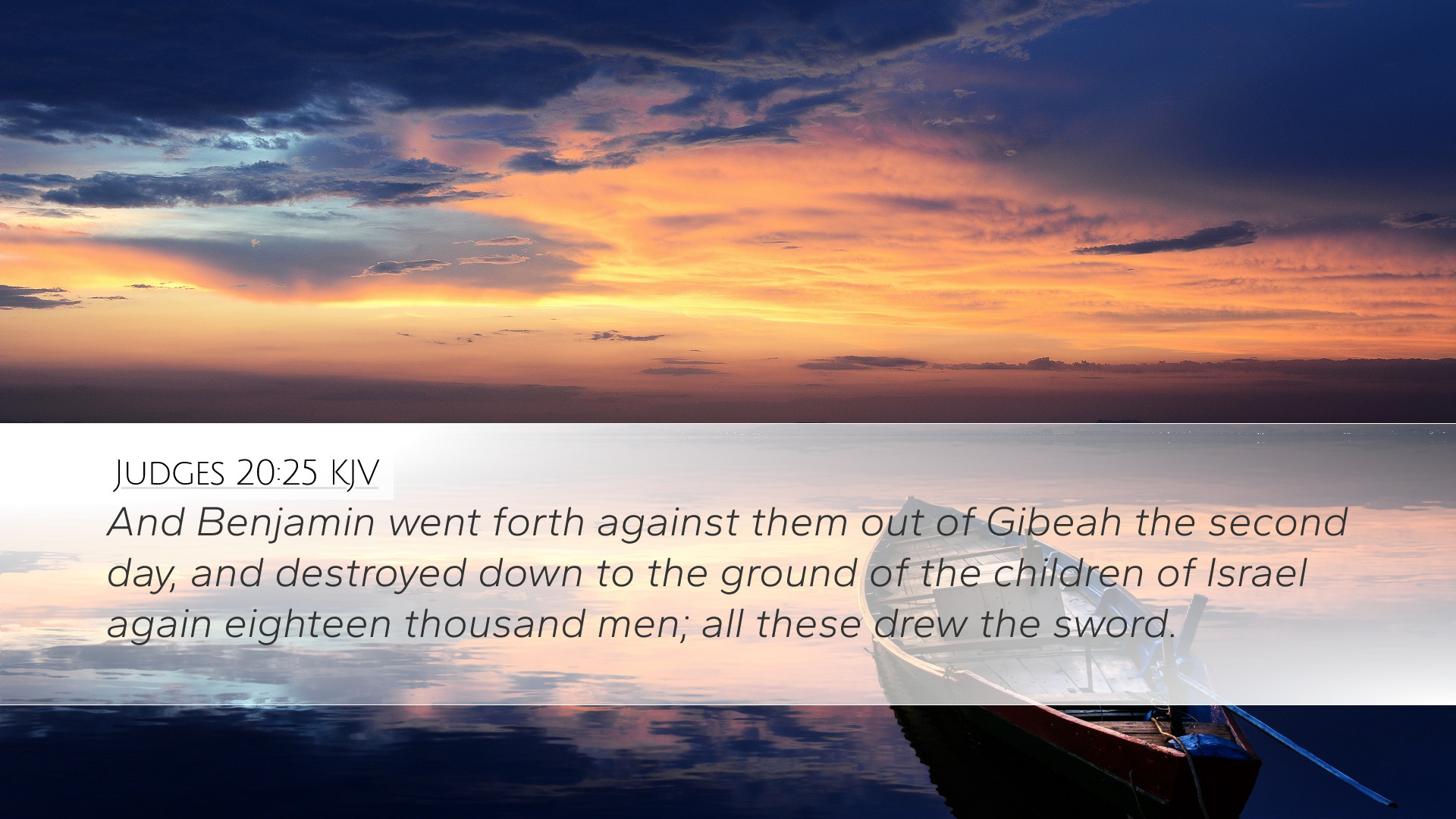Commentary on Judges 20:25
Introduction
Judges 20:25 presents a vivid snapshot of conflict, chaos, and the moral decline of Israel during the time of the Judges. This verse reads: "And Benjamin came forth against them out of Gibeah the second day, and destroyed down to the ground of the children of Israel again eighteen thousand men; all these drew the sword." The unfolding narrative reveals significant themes regarding justice, sin, and the dire consequences of civil discord.
The Context of Conflict
Historical Background
The events leading to Judges 20 are steeped in the idolatry and immorality that characterized the era of the judges. The Levite's concubine was maltreated and ultimately led to her death, provoking a national outrage against the tribe of Benjamin, the city of Gibeah being the focal point of this heinous act. As observed by Matthew Henry, the horrors of this incident portrayed the moral depravity of the time and the desperate need for justice.
Interpretation of the Verse
The Role of Benjamin
In Judges 20:25, Benjamin's fierce resistance against Israelite forces illustrates a deeper social and spiritual crisis. Albert Barnes remarks that this instance underscores how sin entrenches divisions among God's people, leading to conflict not only externally with enemies but internally among the tribes of Israel.
Military Strategy and Consequences
The text mentions that the Benjamites "destroyed down to the ground" eighteen thousand men, reflecting the deadly effectiveness of their fighters. Adam Clarke emphasizes the skill and ferocity of the Benjamite soldiers, symbolizing a larger conflict of ideologies and righteousness clashing with iniquity. Each battle resulted in a steep toll of lives, showing the tragic outcome of societal breakdown.
Theological Implications
Moral Law and Justice
The evident decline of moral standards during this period raises critical theological questions concerning divine justice and human responsibility. As Matthew Henry notes, God’s allowance of such losses could be interpreted as a chastisement for Israel’s own failures, highlighting the principle that divine justice often unfolds within the scope of human action and collective sin.
Reflection on Leadership
The Failure of Leadership
Amidst the chaos, the leaders of Israel failed to seek divine guidance proactively. Reflecting on this, Albert Barnes stresses the importance of leadership grounded in humility and reliance on God’s wisdom. Without turning to God, the leadership succumbed to human vainglory, thereby exacerbating the conflict and deepening divisions among the tribes.
Lessons for Today
Contemporary Relevance
The implications of Judges 20:25 resonate deeply in today's context. Civil strife, moral failure, and the urgent call for justice remain pertinent issues facing Christians and the global community. We are challenged to reflect on how complacency towards sin, both individually and collectively, can lead to destructive paths, reflected in the fate of Benjamin and the other tribes.
Conclusion
In Summary
Judges 20:25 is a stark reminder of the catastrophic results of sin and the fragmentation of community life when moral clarity is lost. As Adam Clarke aptly puts it, this text is not merely historical but serves as a profound warning to maintain justice, pursue reconciliation, and seek the face of God in all endeavors. The tragic outcomes experienced by the tribes of Israel stand as a powerful testament to the necessity of repentance, unity, and faith seeking righteousness.


